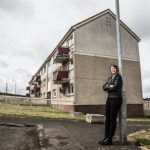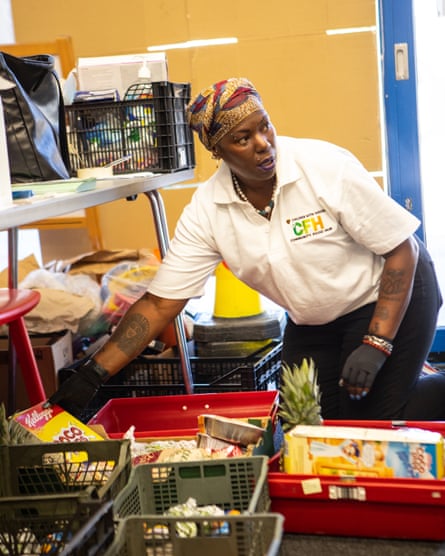
When Michelle Dornelly is hoisting heavy crates of food into and out of her van, she thinks about her building. When her shoulders ache at night and she spots new bruises on her legs, she thinks about her building. She thinks about her building when she contemplates her living room, which is so full of tins that her children long ago stopped using it to watch TV, instead sitting in their bedrooms.
Her building. A place where Dornelly could run the Hackney Community Food Hub, in east London, seven days a week. Where she could store the supplies she keeps in her living room. Where they could run workshops for families and take deliveries from their supermarket partners.
But they do not have a building. Instead, Dornelly and her team of 100 volunteers bounce around three different Hackney community centres, four days a week. On Mondays and Thursdays, the hub is in De Beauvoir Town; every other Tuesday it is in Homerton; and on Wednesdays it is at a different location in Homerton. Since it was launched in April 2020 in response to the pandemic, as part of the charity Children With Voices, the hub has supported more than 100,000 people, despite not having a permanent base.
The building comes up in conversation almost every day at the hub, usually accompanied by sighs, as the volunteers help Dornelly pack up the van. They all worry about how much she takes on. Dornelly is strong, but she can feel her back starting to go. Her ribs are always bruised. Sometimes her fingers seize up into a claw-like shape. She can’t afford to pay private rent on a building: the organisation is a self‑funded food hub, not a large charity. She emailed a detailed proposal to Hackney council in October, asking for assistance in finding somewhere, but the council has not yet secured her a permanent location. She finds this infuriating, as the council refers people to Dornelly for emergency food.
“There are so many empty buildings in Hackney,” Dornelly says. “Why can’t I get a building?” The council even gave Dornelly a civic award. Which was nice. But it is no building.
 View image in fullscreen
View image in fullscreen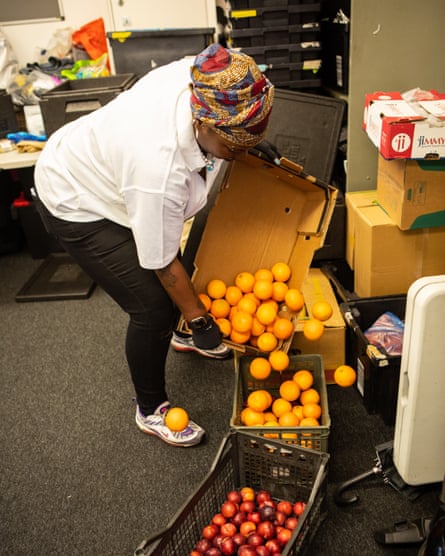 View image in fullscreen
View image in fullscreen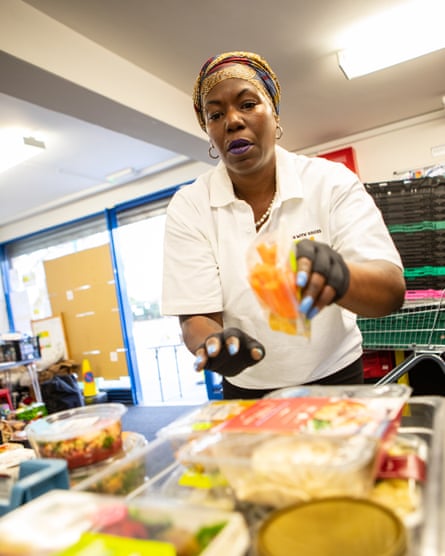 View image in fullscreen
View image in fullscreen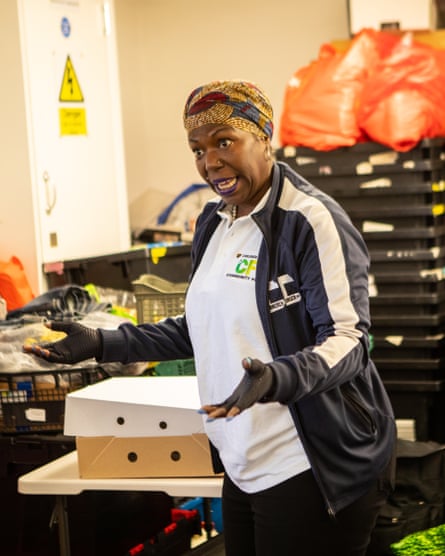 View image in fullscreen
View image in fullscreen
-
Working at the hub is full-on at the best of times – and particularly hectic around Christmas.
Dornelly became a community activist because she had to do something with all of her despair and frustration. It was consuming her. Her sons were getting attacked in the street. (She is a single parent to a daughter and three sons; all of her sons have additional needs.) The boys were continually harassed by the police. It all got so much that she had to get cognitive behavioural therapy. “I was the angry black mother,” she says. “Angry at the world.”
She lives in London Fields, Hackney, an area with high rates of poverty and youth violence. According to a 2021 report from the thinktank Policy Exchange, Hackney has one of the highest rates of knife crime in London. Also, 12.1% of residents have no qualifications, compared with a London-wide average of 6.6%, according to the 2018 Office for National Statistics Annual Population Survey. A 2019 study from Loughborough University said 48.1% of children live in poverty, giving Hackney the third-highest level of child poverty of local authorities in the UK.
I’m experiencing the same situation everyone else is experiencing. I am still struggling myselfMichelle Dornelly
So, in 2010, Dornelly founded the charity Children With Voices, which provides after-school and holiday clubs and mentors local children, with the aim of combating obesity, holiday hunger and gang violence. Initially, Dornelly funded it herself, using money from her benefits. She would walk around local shops, asking if they would donate food for the workshops. “I decided to be a proactive parent, because it was either that, or go mad,” she says.
When the pandemic hit in March 2020, Dornelly pivoted to providing food to the “at-risk” families she had been supporting for years. She put out a call on social media for volunteers and more than 250 people responded. Some of them were middle-class professionals who had moved into the area – Hackney has rapidly gentrified in the past decade, causing house prices to rise to an average of £552,000, compared with a London-wide average of £467,000 – and were horrified by the hidden poverty in their community. “They lived around the corner and had no idea what was happening in London Fields and how bad it was,” says Dornelly. Many of the people the hub supports are on low incomes or benefits.
“The support offered to someone who’s out of work has been falling as a share of earnings since 1960,” says Karl Handscomb, a senior economist at the Resolution Foundation thinktank, which says that the value of the main rate of unemployment benefit that a single person today can expect to receive is only 13% of average earnings.
“What this means is that the level of support being offered is only just above what is considered the destitution line, meaning the bare minimum needed to get by,” says Handscomb. “But people may also be struggling to pay back debts or universal credit advances. That can take them below the destitution line and leave people struggling to decide whether to pay their bills or have food.”
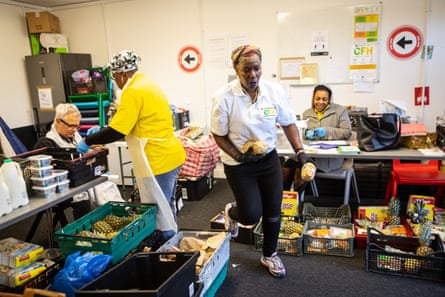 View image in fullscreen
View image in fullscreen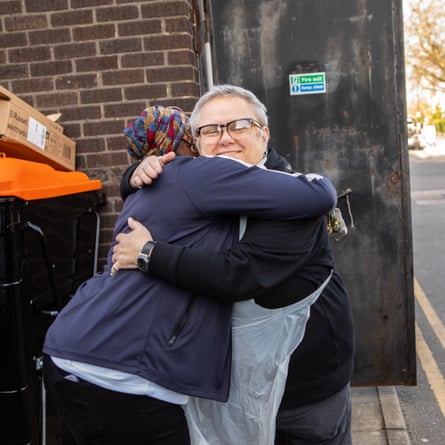 View image in fullscreen
View image in fullscreen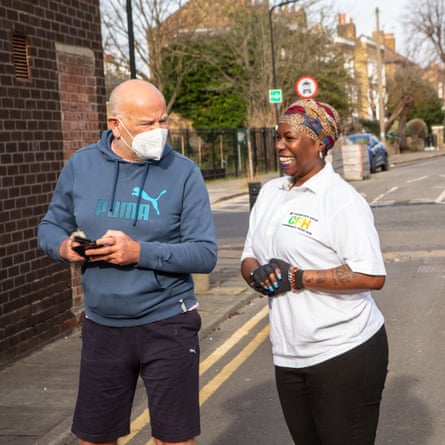 View image in fullscreen
View image in fullscreen
-
Dornelly relies on a team of 100 volunteers, including (top, from left) Ziggy Noonan, Ruth George, Tasha Paul and (bottom right) Brian Parker.
Research from the Family Resources Survey found that 43% of people on universal credit are food insecure, meaning that they struggle to reliably put food on the table. According to the Food Foundation, 9% of all UK households are food insecure. It is estimated that 2.3 million children live in households that have experienced food insecurity in the past six months. Food bank usage has exploded in the past decade. In 2012-13, the Trussell Trust, the national food bank charity, supplied emergency food parcels to 350,000 people; in 2020, this figure was 2.5 million.
Dornelly doesn’t have many good things to say about professional food banks. She is always keen to stress that she runs a food hub, not a food bank, meaning that she doesn’t require people to have referrals when accessing support: anyone can walk up. “We have loads of clients coming to us with horror stories about food banks,” she says. “For some, you have to get a referral, and you can only go there a maximum of three times, and they only give you tins.”
Dornelly and her team of volunteers collect surplus food from local supermarkets, almost all of which would otherwise go to waste. “We say smell it, sniff it, taste it,” she says. “No one’s come back to us in two years to say that anyone got sick or died.”
People are asking me: do I heat the home or fill the children’s bellies and we go cold?
Dornelly’s family eat the same food as her clients: she receives universal credit. She could not afford to work and pay for childcare – plus, one of her sons is often in and out of hospital, due to his medical condition. She receives no salary for her community work, only occasional expenses towards her fuel costs. She says: “I’m experiencing the same situation everyone else is experiencing. I am still struggling myself.”
She is by no means clear of her own financial worries – she is in arrears on her rent – although she doesn’t like to talk about it, because, relative to the community she serves, she says she is doing OK. And she is worried for them. The government’s furlough scheme ended in September. The temporary universal credit uplift of £20 a week was revoked the month after, which has been devastating for Britain’s poorest households.
Handscomb says: “When the chancellor announced the uplift, he said it was to mitigate the temporary costs of the pandemic. But I would argue those costs haven’t gone away. Rising energy and fuel prices are a result of the pandemic.
“We know that people on low incomes spend the biggest share of their income on heating and fuel bills.” He says existing government initiatives are inadequate. “The cold weather payment and warm home discount scheme are likely to provide only a few hundred pounds of support.”
When the energy price cap goes up by 54% in April, the 22m households on default or variable rate tariffs will see their energy bills rise by £693 a year on average. The new price cap will put more than 25% of households into fuel poverty, according to the Resolution Foundation, meaning that they spend more than 10% of their income on energy bills after paying for housing costs. Research from the Food Foundation found that 55% of households with children fear that not being able to afford their energy or food bills will directly affect their children’s health and wellbeing.
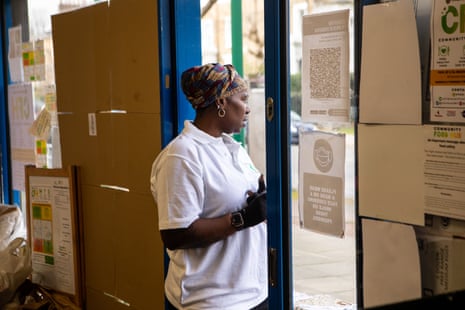 View image in fullscreen
View image in fullscreen
-
A rare moment of peace.
“I know people who have five or six children at home,” Dornelly says. “Furlough has finished and their benefits have gone down. Gas prices have gone up. They have to heat the house because they have children. They’re asking me: do I heat the home or fill the children’s bellies and we go cold?”
Yet, says Dr Rebecca O’Connell, an expert in the sociology of food and families at University College London (UCL), there are even worse predicaments. “It’s a cliche, isn’t it?” she says (UCL). “Having to choose between heating and eating. But some people aren’t even in that situation. They have neither heating, nor anything to eat.”
It is the first week of November. Dornelly is at the De Beauvoir hub on a Monday morning. It is a cramped room, full of crates of food. On two trestle tables, volunteers sort out donations of meat, ready meals and packaged salads. Dornelly is beavering away in a corner of the room, allocating half the donations to be packed up and taken to the Tuesday hub in Homerton.
Tuesday. Lizzie, a regular, arrives at the hub. She is in her 80s and walks there every week, even though volunteers would be happy to deliver her food and it takes her an hour each way. Walking helps her arthritis, she insists. Lizzie’s family do not know she comes to the food hub: she is too proud to tell them. Were it not for the hub, Lizzie wouldn’t be able to afford fresh fruit and vegetables.
Food is how we live and participate in society. Being excluded is very painfulDr Rebecca O’Connell
“A common strategy for people on very low incomes is to buy food that is filling, rather than nutritious,” says O’Connell. Public Health England publishes an Eatwell Guide, which outlines the optimal diet to meet basic nutritional standards. According to the Food Foundation, 27% of households would need to spend more than a quarter of their disposable income after housing costs to meet these dietary requirements. Many simply do not have the money to do so.
Lizzie also picks up food for one of her neighbours, a man in his 80s who lives across the road from her. She used to split her food parcel with him, until Dornelly got wind of it and instructed her volunteers to make up a second parcel. Dornelly has a soft spot for Lizzie. She always stops to chat to her, no matter how busy she is. But although Dornelly doesn’t let the clients see her exhaustion, everything is starting to get on top of her. It is just relentless.
“It’s starting to wear me out,” Dornelly says. One client has travelled all the way from Romford, Essex, with their child: they were rejected by their local food bank because they used it too often. Today, a volunteer is in tears because a client has confided in her that she has been going to bed hungry to feed her daughter.
“Parental sacrifice comes up a lot in our research,” says O’Connell. “Most commonly, it is mothers who are heading up lone parent households and have had cuts to their benefits. They go without food so the children have enough. We also see older children sacrifice their food intake to protect their siblings.” Research from the Living Wage Foundation found that 37% of parents working full-time and earning less than what it terms the “real living wage” regularly skip meals for financial reasons.
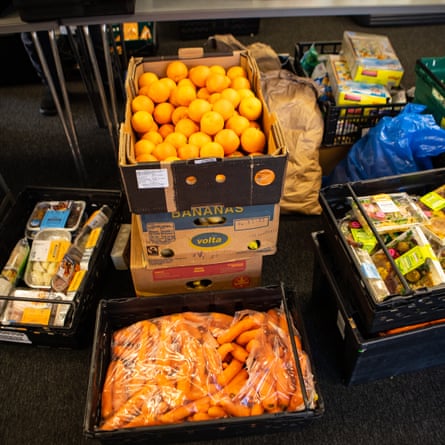 View image in fullscreen
View image in fullscreen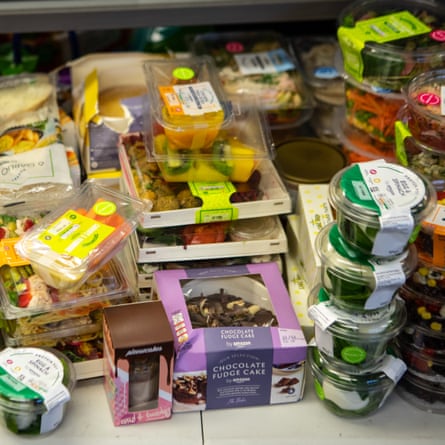 View image in fullscreen
View image in fullscreen
-
This food will be used to feed those in need, but Dornelly has occasionally been forced to refuse donations due to a lack of storage space.
According to the Office for National Statistics, the poorest 10% of households spend just £34.40 a week on food and non-alcoholic drinks. Any unexpected costs – new school uniforms, benefits sanctions – can wipe out a food budget. This is without the increasing cost of food, being driven by Brexit and Covid-related issues in the supply chain. In January, grocery prices were 2.7% higher than a year ago, while wages remain stagnant for many people.
“You often hear this idea that low-income families need to be taught to budget and cook. But, usually, low-income families have a really good idea of the cost of things,” says O’Connell. “When you have less to spend on food, you’re much more sensitive to those price rises.”
The Homerton hub always serves a hot meal on a Wednesday. One regular arrives and eats seven bowls of soup in a row, to Dornelly’s alarm. “He’s starving,” she says. “What’s going on? What’s happening?”
Mid-November. At 7pm on Saturday, Dornelly gets a text message from a mother of three: “Sorry to message you so late, but I’m just wondering if you know of any food hubs that are open.” Dornelly meets her the morning after and hands over a bag of food.
A few days later, Dornelly gets a phone call from Claude, one of her volunteers. He regularly picks up food from a Marks & Spencer store in central London and drives it to the De Beauvoir hub. But he has just been given an £80 parking ticket. This is his third ticket. Dornelly decides that she can’t risk any more and informs M&S that she is no longer able to collect their leftover food. If the hub had a building, they could store items for longer, meaning they wouldn’t have to run about all the time, parking where they shouldn’t and racking up fines.
All week, Dornelly is so frustrated that she keeps breaking down in tears. All she can think about is her building. The volunteers keep asking her about it. “My life is not my own,” she says. “I eat, breathe and sleep this. I’m out in the daytime working on it all day and I’m doing emails at night until 2am. I’m not getting paid for any of it. It’s too much to handle. I just want them to let us have a building.”
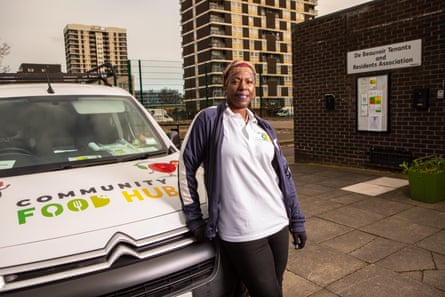 View image in fullscreen
View image in fullscreen
-
Outside the De Beauvoir hub.
First week of December. Demand is increasing. Dornelly is working 80-hour weeks, even though her volunteers try to minimise her workload by never emailing her out of hours.
A pensioner comes to the Monday morning hub. He tells Dornelly that he is trying to live within his means, but he just can’t manage it. The pensioners really get to her. “The elderly fought in the war,” she says. “They gave their life for our country. And they’re sitting in their chairs with the little they have from their pension, thinking: do I eat or do I heat the house?”
Dornelly doesn’t like it. She doesn’t like it when she is pressing packets of food upon grateful but ashamed elderly people. She doesn’t like it when she drives past homeless people on the streets on her way home. She doesn’t like it when she sees expensive blocks of flats popping up all over the borough, developments that will push up rents and drive locals out of the community. She doesn’t like any of it. “There is no need for it,” Dornelly says. She is standing outside the hub, shivering in the cold. “The way the government is treating people.” She almost spits out the words.
I eat, breathe and sleep this. I’m out in the daytime working on it all day and I’m doing emails at night until 2am
“One of the solutions to food poverty is to ensure that wages and benefits are adequate to allow families to buy food that meets their needs for health, but also for social participation,” says O’Connell at UCL. “Food is how we live and participate in society. Being excluded from that is very painful.” She has carried out research in other inner-London areas with similar demographics to Hackney. Children would talk to her about the experience of never being able to go to Costa for a hot drink and a slice of cake, like their friends, because that might be half of the family food budget. “When children are surrounded by expensive eateries and coffee shops that some of their peers can go to, but they cannot, that is really excluding,” she says.
A woman calls Dornelly on Thursday evening, after the Homerton hub closes. Dornelly takes a bag of food and meets her in Dalston. When the woman arrives, she is faint with hunger. She is in her 60s, a pensioner. She asks if it is OK to give out some leaflets for the food hub to other people who are struggling. Dornelly presses them upon her.
Mid-December. There are issues at the Wednesday hub in Homerton. The building is open to the public and people attending events keep helping themselves to food from the food hub’s fridge. Dornelly remonstrates with one of the people who manage the building, but the man is dismissive; he tells her that if someone ate her food, it must have been because they were hungry.
The man pulls out some money and tries to thrust it upon her. Dornelly refuses to take the money, telling him that it is about the principle. She wants people to respect what she is doing. She says that the man throws the money into her fridge instead.
Dornelly goes outside to get away from him. She is hyperventilating. A teenager walking past asks her if she is OK. “I felt so bad,” she says. “I felt so low.”
She is sick of lugging the crates between community centres, getting bruised and wrecking her back, only for people to help themselves to the food she sets aside for people in need. “I’m just getting tired,” she says. “I don’t know how much I can continue to go on. Because it’s getting a lot.”
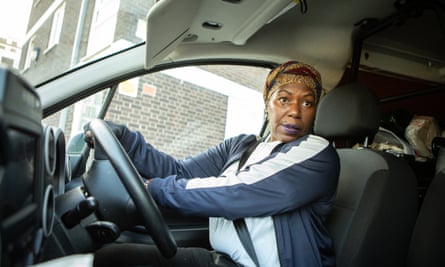 View image in fullscreen
View image in fullscreen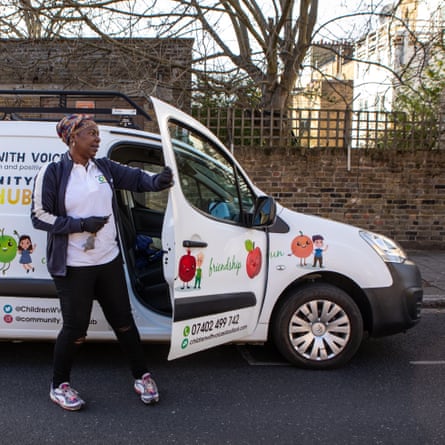 View image in fullscreen
View image in fullscreen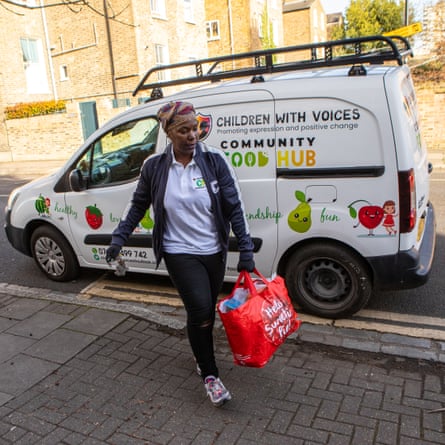 View image in fullscreen
View image in fullscreen
-
Dornelly and her team will deliver to anyone unable to visit the hub.
Christmas week. The man has texted Dornelly to apologise. She plans to avoid that hub this week all the same. She can’t face seeing him.
On Monday, one of Dornelly’s volunteers, Ziggy Noonan, sends her a voice note. She has just had a phone call from a distressed mother with a daughter of 12, with no money for food. The headteacher of her daughter’s school gave her the food hub’s number. “Honestly, Michelle, she was sobbing,” says Noonan. “I said: ‘It’s OK, it’s going to be all right, we’re going to support you here.’ I got a bit emotional myself.”
At the Tuesday hub, Christmas music plays. Noonan is dressed up as Santa. Dornelly’s 22-year-old daughter, Renisha, is wrapping presents on a trestle table in the open air. Every child arriving at the hub today will receive an age-appropriate gift. For some, it may be the only gift they receive. Dornelly is in a Santa dress, accessorised with her signature slash of purple lipstick. She is in frantic form, darting from volunteer to volunteer and coordinating drop-offs from local businesses and well-wishers. She stops to chat to a stressed-out mother whose benefits are about to be sanctioned because she doesn’t have the laptop she needs to complete her online learning. “It’s horrible,” Dornelly sighs.
Barry, one of her regular volunteers, comes in to pick up a parcel for a woman in her 80s. Her husband died recently and she is struggling. “They call me black Jesus,” Barry chuckles to the volunteers as he bags up the food.
Some volunteers lived around the corner and had no idea what was happening in London Fields and how bad it was
The council dropped off a carrier bag earlier, containing a few toys and some biscuits. “There’s nothing to it,” says Dornelly, dismissively. The council has previously supplied the hub with bulk food orders, while Dornelly has received some funding and assistance with querying parking tickets. But relations between the council and the food hub are strained at best. To add insult to injury, last night she got another referral from a council worker, directing her towards someone who needed emergency food.
In response, the mayor of Hackney, Philip Glanville, told the Guardian: “Children With Voices is part of the Hackney Food Network, a partnership of over 60 community organisations in the borough providing food solidarity to residents through community food hubs, co-ops and food banks, and I am very grateful to all the organisations in our network for the work they continue to do in supporting our residents.
“The council seeks to work closely with all of the community partners in our network, and has specifically supported Children With Voices with bulk food orders and in connecting it with the commercial property team for a suitable vacant property. A number of sites have been discussed, but a suitable property has not been found yet.”
Boxing Day. Dornelly drops off a food parcel to a homeless man in his 50s, whom the hub has been supporting on and off for two years. The council keeps moving him from hostel to hostel. “He was very grateful we hadn’t forgotten about him,” she says.
First week of January. Dornelly gets an exciting email: someone is trying to convert a Clapton church into a community centre and asks if she would like to come and have a look. Dornelly heads down, but the space isn’t big enough for the food hub.
She is about to close up the Thursday hub when a 94-year-old woman comes in, accompanied by a friend. The woman had a fall a few weeks ago and, because she lives on a quiet road, she was left out on the street, in freezing weather, for nearly three hours. Her friend, who looks out for her, heard about the food hub and brought her to it. Dornelly tells the woman her volunteers can drop off food to her front door and keep an eye on her. “I’m still coming to terms with it now,” she says. “Imagine that poor lady being left on the ground for three hours. It’s diabolical. People like that should be monitored.”
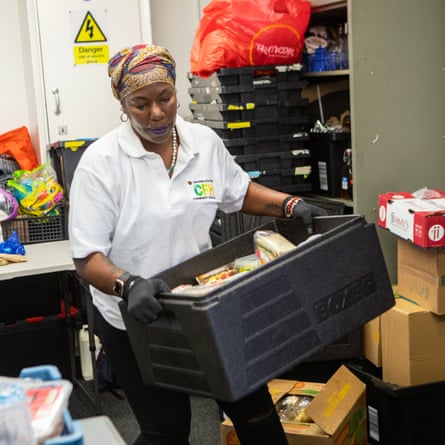 View image in fullscreen
View image in fullscreen
-
The work is physically demanding, leaving Dornelly with bruises and back pain.
Second week of January. After an unseasonably warm end to the year, a cold snap arrives. At the De Beauvoir hub on Monday, clients are complaining about the cost of gas. Inflation has reached 5.4%, its highest level in 30 years. “This is the steepest rise in the cost of living we’ve experienced since the 1990s,” says Handscomb. “If the government wants to protect the incomes of low- to middle-income households, it has to do something.”
In response to the growing cost-of-living crisis, and the news that the energy price cap is to rise by more than 50% in April, the government last week announced a one-off energy bill rebate of £200 in October, although this amount will have to be repaid in £40 increments over the next five years. Council taxpayers in bands A to D in England will also receive a £150 rebate that will not have to be repaid. The government will also increase the number of homes eligible for the warm homes discount.
Around Dornelly, her team is working conscientiously, bagging up individual portions of fruit and vegetables – someone has donated a gleaming box of pastel-pink rhubarb – and sorting through packets of meat. Salads and sandwiches are stacked on a trestle table; Dornelly presses her team to have some for lunch. She mothers all of them, constantly checking to see that they have had something to eat, calling everyone “darling” or “sweetheart”, regardless of their age. A volunteer makes Dornelly a cup of tea, but she gets distracted and it goes cold. (This is typical of her; Dornelly always has to reheat her hot drinks in the microwave.)
Demand is intensifying. The team signs up three new clients for deliveries in one day: one young person who is vulnerable, two pensioners who live alone. But despite this increase in need, Dornelly is having to turn away food. M&S emails to offer another collection, but Dornelly wouldn’t have anywhere to keep it. “Thank you for the opportunity,” she responds, “but until we can get a bigger building I will have to say no thank you this time.” It is painful, having to turn down food.
Come Thursday, Dornelly is meant to be having a day off when she checks her Instagram. “I’m in dire need of help to get through until Wednesday for my two-year-old, partner, and me,” a woman writes. Dornelly invites her down to the Thursday hub, but she doesn’t have any money for the bus fare. “I don’t have any money to my name at all,” the woman writes. A volunteer drives to the woman’s house and drops off some food.
Later the same day, another client messages Noonan. She forwards it to the hub’s WhatsApp group. “I tested positive for Covid and I have nothing, even my bread is green,” the client writes. “Is there anything you can help with by getting some food bits here? If not, no worries, thanks for the help always.” Another volunteer, another drop-off.
Mid-January. More issues at the Homerton hub. Dornelly has been allocated a fridge, but it is overflowing with food – her volunteers have to tape it shut. There is a second fridge, but she says she has been told that she is not allowed to use it. Now, when Dornelly goes in there, she feels there is a horrible atmosphere. She feels as if she is being monitored by the people who manage the building. She says they find excuses to come into the hub and hover, watching her team.
Dornelly has been feeling unwell all week. The stress of the situation causes her to break down in tears. “This is making me sick,” she says, choking back sobs. “I’m getting weak and emotional about it. It’s not making me better. It’s just getting really awkward and complicated. I don’t know what they want from me. I’m bringing in food to serve their community. If I bring in less food, less people will get fed.”
Late January. Late Monday evening, she is at home when one of her volunteers knocks on her door and unexpectedly unloads a crate of M&S food. Dornelly takes it, even though she doesn’t have anywhere to store it, because the hub isn’t open tomorrow. She drops most of it off at a local homeless hostel and makes up a bag to take to Lizzie.
When she gets there, Lizzie is upset. She has been looking after a neighbour, a man in his 80s, who lives alone. He just got out of hospital. Lizzie always brings him food from the hub. When she got there earlier, she found him sitting in the dark. There was no gas or electricity. It was cold. He didn’t have a bed. Lizzie contacted the council and someone went around and switched his gas and electricity back on, but he is still in dire need.
Tomorrow, Dornelly will arrange for a food parcel to be dropped off at his house. She will try to find him a bed, a mattress and a warm quilt. She will make sure that her volunteers go around there regularly, to provide him food. She will check on him herself. “I don’t like to see how he’s going to be living in that house on his own when it’s so cold,” says Dornelly.
Sometimes it feels as if everything is disintegrating around her. There is so much need, everywhere she looks, in this city. The institutions that should be helping don’t seem to do anything. What would happen, Dornelly wonders, if she just stopped? Who would look after all these people – and all the other people they don’t even know about yet?
But there is no time to think. There are crates to be stacked and loaded into the back of the van. Drop-offs to be coordinated. Street corners to wait on, to press food into the hands of hungry, desperate people. Pensioners to visit and donations to sift through. Dornelly’s body may be bruised and exhausted, but she plans to keep on going, for as long as she can.
To make a donation to the food hub, visit gofundme.com


